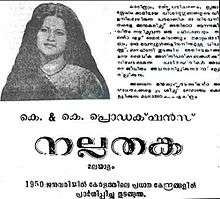Nalla Thanka
| Nalla Thanka | |
|---|---|
 | |
| Directed by | P. V. Krishna Iyer |
| Produced by |
Kunchacko K. V. Koshy |
| Written by | Muthukulam Raghavan Pillai |
| Starring |
Augustine Joseph Vaikom Mani Miss Kumari Miss Omana S. P. Pillai |
| Music by | V. Dakshinamoorthy |
| Cinematography |
A. Shanmugham P. K. Madhavan Nair |
| Edited by | S. Williams |
Production company |
K & K Combines Udaya Studios |
Release dates |
|
| Country | India |
| Language | Malayalam |
Nalla Thanka is a landmark Malayalam film directed by P. V. Krishna Iyer, and produced by Kunchacko and K. V. Koshy. It was the second film produced at the Udaya Studios, the first being Vellinakshatram (1949). The film marked the debut of several artistes, including actors Augustine Joseph, Vaikom Mani, Miss Kumari, Miss Omana and S. P. Pillai, music director V. Dakshinamoorthy, and cinematographer P. K. Madhavan Nair. It was one of the first commercially successful Malayalam films.
Based on the legend of Nalla Thanka (Nalla Thankal in Tamil), the film had screenplay and dialogues written by Muthukulam Raghavan Pillai. Miss Kumari played the title role, while singer-stage actors Augustine Joseph and Vaikom Mani played the lead male roles.
Plot
Nallannan is the King of Madhurapuri. His sister Nalla Thanka is married to Somanathan, the King of neighbouring country Ratnapuri. Alankari, the wicked queen of Madhurapuri becomes envious of the happy married life of Nalla Thanka. Years pass and one day, drought strikes Ratnapuri. Nalla Thanka and her seven children seeks refuge in Nallannan's palace. Nallannan promises all help while Alankari tortures Nalla Thanka. But Nalla Thanka hides the misdeeds of Alankari from her brother as she does not want their family life to be disturbed.
Nalla Thanka is forced to leave her brother's palace. She decides to kill her children and commit suicide. She throws her children one by one into a well. Before killing herself, she prays to Lord Shiva to forgive her for the decision. Shiva descends and saves her life, and brings back all the children. Nallannan comes to know about his wife's misdeeds and he banishes her from the country. Meanwhile, Ratnapuri regains its glory and Nalla Thanka returns to her country to lead a happy life.The film is actually a remake of the Tamil film Nalla Thangal, which was released in 1935.
Cast
- Augustine Joseph as Nallannan
- Vaikom Mani as Somanathan
- Miss Kumari as Nalla Thanka
- Miss T. R. Omana as Alankari
- S. P. Pillai
- Muthukulam Raghavan Pillai
- Baby Girija
References
- "Nalla Thanka 1950". Chennai, India: The Hindu. 30 August 2010. Retrieved 7 March 2011.